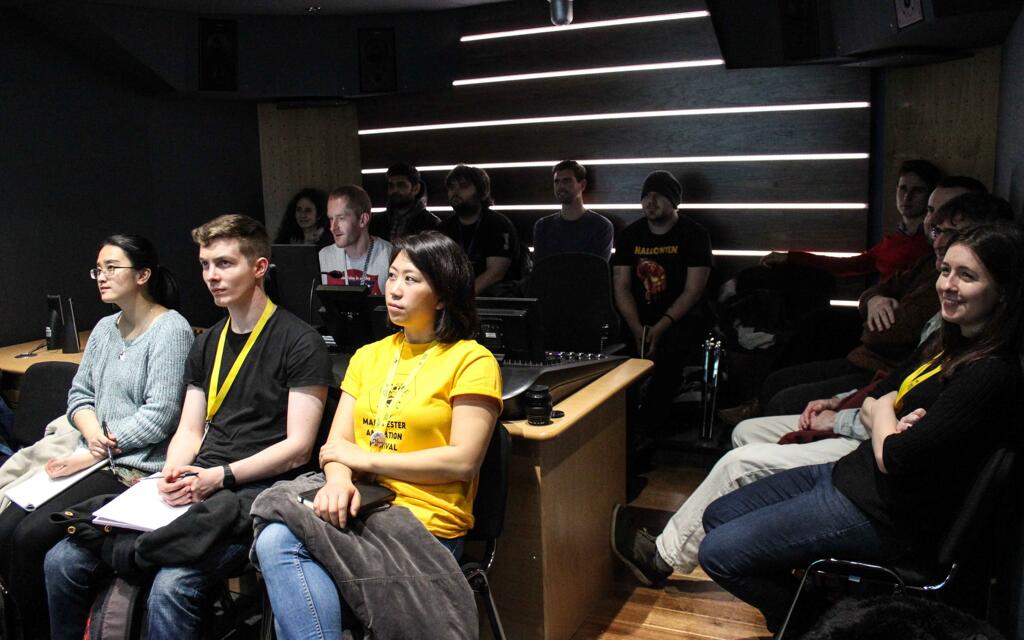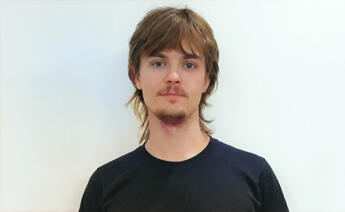 31
Aug
31
Aug
Our next Open Day
Saturday 31 August 12PM-4PM
Open Days are a great opportunity to find out more about our courses, meet our expert tutors and see our facilities in action. They're the perfect introduction to student life.
Book your placeThe foundation year in music production is your launchpad into the world of music. It will build confidence and introduce you to the fundamentals, nurturing your creative and technical skills to prepare you for further study. On successful completion of the foundation year, you’ll automatically progress onto our BA (Hons) Music Production degree.
Throughout the course, you’ll use our state-of-the-art studios and learn the core elements of music production, including composition, arrangement, sound design, recording, sampling and mixing. In addition to the technical skills, you’ll also develop your creativity and critical thinking skills. You’ll learn how to work independently and as part of a team, and you’ll gain the experience to express your own musical ideas.
If you’re passionate about music and you’re ready to take your skills to the next level, then the foundation year in music production is the perfect place for you.
Awarded by

Have any questions or would like to tour our studios? Get in touch
You will gain expertise in both analogue and digital audio production, allowing you to adapt to any studio environment. This will ensure that you leave our programme with a clear and professional presence as a music producer, with a well-established creative voice.
No matter your genre, this course will help you take your music to the next level. You’ll learn the creative and technical skills you need to produce professional-sounding music, regardless of whether you make acoustic or electronic music, house, folk, or metal.
You’ll have access to a range of recording studios and equipment, allowing you to experiment and push your musical style to its full potential. This programme is unique in its focus on the studio as a creative environment. In addition to learning the technical skills of sound production and engineering, you’ll also explore the creative artistry of music.
Our programme’s module on sound design and composition for moving image give you the opportunity to develop skills that are applicable across the music industry and beyond.
All of our courses are constantly evolving to ensure teaching and learning remain relevant and up to date. Here is the latest example of the curriculum for Music Production with Foundation Entry:
This practical module will help you develop your knowledge of composition, arrangement, and music technology through the performance and recording of an original piece of work. You will also develop your independent creative practice by gaining fundamental performance skills, rehearsal techniques, and knowledge of studio protocols.
Assessment: Practical project with a reflective report. 40 credits.
This module will explore the contemporary and historical contexts of creative practice, with a particular focus on performance and media. You will be introduced to a range of genres, styles, and disciplines, and encouraged to think critically about how they can influence your own work. The aim of the module is to provide you with a foundation in study skills that will equip you for undergraduate study.
Assessment: Reflective report and presentation. 20 credits.
This module will introduce you to the fundamental principles and practical applications of sound recording and sound design. You will learn about multi-tracking, mixing, audio recording, and a basic understanding of how sound works in relation to music and media.
Assessment: Practical portfolio. 20 credits.
This practical module will develop your technical skills in all aspects of the modern digital audio workstation (DAW). You will learn how to create and edit music in a purely software-based environment. You will also learn fundamental sound processing techniques using a range of software applications, both native to the DAW and third-party plugins. This will encourage your creative experimentation and evaluation.
Assessment: Practical portfolio and report. 40 credits.
Through the study of a diverse range of practitioners and their work, you’ll explore creative techniques used in both composition and arrangement across different styles and genres of music. This module will allow you to gain inspiration from established producers, encourage you to explore alternative methods of creating sound, and help you to build up a portfolio of original and professional compositions.
Assessment: Portfolios of original compositions for a range of songwriting and composition styles. 40 credits.
Developing your skills in recording, editing, and mixing, this module will give you a key understanding of different microphone types and techniques. You’ll also be introduced to factors affecting the recording process in either a live or location based setting. Through practical experimentation in the studios, you’ll then learn to assess the needs of individual recording sessions and how to use your skills to your advantage.
Assessment: Ensemble recording and report, Location recording and report. 40 credits.
Through the analysis of online presence throughout the industry, this module will introduce you to the importance of effective self-representation and the creation of both original and targeted content to build a significant following. You’ll also gain skills in branding, social media marketing and web-design, allowing you to develop a clear presence for yourself as a producer.
Assessment: Essay, a marketing presentation and website portfolio. 40 credits.
Through further experimentation in the studios, you’ll build on your recording skills while also learning to effectively use both analogue and digital methods at different stages during the production process to enhance your final mix. You’ll also study mastering and editing techniques, whilst continuously reflecting on your work to develop a deeper understanding of your role as an engineer and producer.
Assessment: Recording project and report as well as both an analogue and digital mix. 40 credits
Introducing you to the world of sound design, you’ll develop your creative skills in composition and learn to create music for a range of media before presenting your work as an installation of both audio and video assets. Through the research of standard industry practices in this field, practical experimentation with synthesis, Foley, and sound effects creation, you’ll build up a significant library of assets suitable for use in music, film, and games applications.
Assessment: Sound design and installation presentation. 40 credits.
By developing original compositions and working with existing materials to create an effective remix, this module encourages you to blur the lines between composer and producer while taking both a creative and functional view of your work.
Assessment: Original compositions that highlight different core skills such as production and remixing. 20 credits.
Working to a real-world client brief, you’ll develop a clear strategy to achieve the goals and requirements of the commissioning client. Assignments in this module will encourage you to think critically about your work, and use the skills and knowledge you’ve gained across other modules to create a professional product that meets specific criteria.
Assessment: Client based production and follow-up presentation. 20 credits.
Guided by your individual tastes and interests, this module will inspire you to think about your approach to composition differently. Focusing on synthesis and innovative techniques, you’ll apply creative strategies to generate original tracks, evaluate their success, and present them as a finished piece, thinking critically about your techniques throughout.
Assessment: Creative composition and follow-up presentation. 20 credits.
Now confident in the running of recording and mixing sessions in the studios, you’ll have the freedom to fit the content of this module to your specific working needs. Focusing on the further development of your skills and the refinement of your workflows, you’ll produce recordings to a professional standard, applying advanced mixing and mastering techniques in our state-of-the-art studios.
Assessment: Recording and report. 20 credits.
Exposing you to a variety of career opportunities, you’ll gain a range of key skills relevant to entrepreneurship and self-employment. Concentrating on preparing you for work as soon as you graduate, this module will help you understand how different businesses function in the music and audio industries, and how you can find your place within it.
Assessment: Proposal and portfolio. 40 credits.
This is when you test out everything you’ve learned over the course of your degree as you take your work to the public. Throughout this module, you’ll create an original project to a high professional standard, whilst planning and managing its launch into the public domain. Focusing purely on your own creative goals, you can take your work in this module to a whole new level, making your first steps into the industry as a professional producer/engineer.
Assessment: Major project and archive. 40 credits.
Teaching takes place in a variety of formats including lectures, workshops, demonstrations, peer reviews and one-to-one tutorial support. Our aim throughout is to encourage your creative exploration and hone your technical skills, all so you’ll leave us as a confident, independent and practically minded professional.
A minimum of 40 UCAS points at A2 or equivalent. You should also have achieved Grade 4 or above in GCSE Maths and English, or an equivalent (UK equivalents include key skills level 3 or functional skills level 2). If you are an international applicant you must have UK settled status in order to study on our degree courses. Non-native English speakers require IELTS: 6.0 with no component lower than 5.5.
Tuition fees for all our undergraduate courses are eligible for government funding through Student Finance England, subject to a successful application. *These fees are for 2024 entry and will increase to £7,250 for the Foundation Year for 2025 entry.
UK-based university applications are made through UCAS. You’ll need to register via ucas.com to create an application. You can then add this course as a choice to your application using the following information.

If you have any questions about this course, your application or if you'd like to arrange a tour of Spirit Studios, please get in touch on: